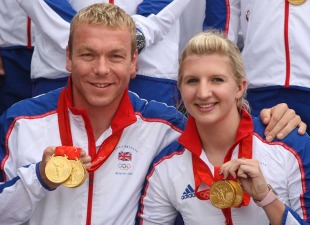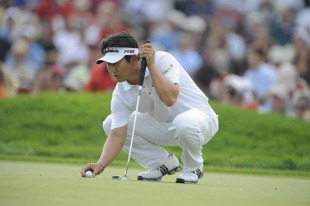- August 16 down the years
A golden day for Britain

2008
A golden day for Britain at the Beijing Olympics. Four medals of the top colour.
Rebecca Adlington not only won her second title at these Games, she broke the oldest world record on the books. After her superb narrow win in the 400 metres freestyle (August 11), she swam double that distance in 8 minutes 14.10, knocking more than two seconds off Janet Evans's time from way back in 1989 (August 20), the year Adlington was born! She had company for only the first quarter of the race, pulling away after halfway and finishing six seconds clear of Italy's European champion Alessia Filippi and future world champion Lotte Friis of Denmark. Adlington was the first British swimmer to win two golds at one Olympics since Henry Taylor (born March 17, 1885) a hundred years earlier.
On another stretch of water, British rowers won the coxless fours for the third time in a row - and for the third time in a row had to suffer for it. After the excruciatingly tight races which led to Steve Redgrave's fifth gold in 2000 (September 23) and Matthew Pinsent's fourth in 2004 (August 21), Steve Williams's second was achieved by a lung-bursting surge that overhauled an Australian crew who'd led by nearly a length. Williams and Pete Reed had been ever-present in the boat that year, but Tom James and Andrew Triggs Hodge had suffered back injuries, so victory was particularly sweet. And hard-earned.
There were more golds for Britain in cycling, where their track team dominated the Games. Today Chris Hoy's great thighs added a second title to the team sprint they'd won the day before. His tactic in the keirin was simple but a killer. Get in front of everyone else, right behind the motorbike, and stay there. While he was winning easily, his team mate Ross Edgar snatched silver on the line. Someone counted that Hoy's gold was Britain's 700th medal at the Olympics.
Sir Chris's only rival as ironman of the track was his team mate Bradley Wiggins, who also won gold today, retaining the individual pursuit title he won in 2004 (August 21). In the final against Hayden Roulston of New Zealand, he gradually upped his pace to grind out an easy win by nearly three seconds, setting an Olympic record in the process. Britain's Steven Burke took the bronze, Wiggins another gold in the team event (August 18).
2008
Despite all these British successes, the big news stories, even in Britain, were elsewhere.
Back in the swimming pool, Michael Phelps won his seventh gold of the Games to equal the iconic record set by Mark Spitz in 1972 (September 4). It was a close-swum thing, and for a moment Spitz must have thought he was going to stay in the records books. Then he had to grit his teeth and get his congratulations speech ready. At the end of today's 100 metres butterfly final, Phelps was only seventh at the turn - and although he powered down the second length, he misjudged his approach to the wall. Left with the classic knife-edge choice of gliding in or taking an extra stroke, he went for the stroke. To his left, Milorad Cavić of Serbia, who'd set a Games record two days before, chose to glide. They touched almost simultaneously - but Phelps was given the nod by a hundredth of a second. It was closer than that - enough for the Serbian team to launch a protest. The sport's governing body slowed the film down to thousandths of a second, even ten-thousandths, before announcing that the result stood. When the Serbs took the same look, they had to agree. What made it even harder for Spitz to take was that Phelps had won gold number seven in one of his own events. And the eighth gold medal was a formality (August 17).
But even this race wasn't the highlight of the day. It couldn't compete with the moment Usain shot his first bolt.
It wasn't just the gold medal. Or the world record. He'd been favourite for the former after setting the latter earlier in the year. It wasn't even that he ran the 100 metres in 9.69 seconds. It was the manner of doing it. The way he suddenly stopped sprinting near the end, celebrating with his arms held low. It left the world gasping: how fast could he have gone if he'd driven through the tape? He gave us the answer on the same day a year later, when he won the World Championship in 9.58. Back here in Beijing, he seemed to have landed from another planet, all 6' 5 of him. Even Michael Johnson's monster time in the 200 metres suddenly didn't look unbeatable (August 20)...

2009
While Bolt was picking up his first world title, golf was seeing the first Asian to win a men's Major. The US PGA was decided at the short par-four 14th. Tiger Woods and South Korea's YE Yang both tried to drive the green and both ended up in a greenside bunker. While Woods for once hit a poor shot, Yang's chip rolled all the way in for an eagle. At the last hole, Yang held a one-shot lead and made a birdie from ten feet to win by three strokes. It was the first time Woods lost a Major after being in the lead going into the final round.
1992
The day Nigel Mansell was confirmed as world champion. It had been only a matter of time from the moment he won the first five races of the Formula One season. Now the coronation took place with five more to spare, after Britain's finest finished second behind Ayrton Senna at the Hungarian Grand Prix. The title was clinched when Mansell's Williams team mate Riccardo Patrese dropped out with engine trouble. Our Nige had waited six years for this, ever since his last-day heartache in Australia (October 26). Now he celebrated in style by winning nine races in the season (September 27), a record at the time.
2008
World Cup winning full-back Percy Montgomery played his 100th Test for South Africa. For once, he didn't score a point as New Zealand won 19-0 in Cape Town. Montgomery won two more caps, finishing with 893 points, including 35 against the country of his birth (August 15, 2007).
2004
Host countries win a lot of Olympic gold medals they wouldn't have won abroad - none more so than in the diving events in Athens. Peng Bo and Wang Kenan of China had never lost an international competition in the synchronised springboard, and now they led by twelve points with one dive left. But, amazingly, out of absolutely nowhere, Wang lost his bearings and landed like a carcass, leaving them out of the medals. That left the way clear for Russia's reigning world champions, Aleksandr Dobroskok and Dimitri Sautin - only for Sautin, one of the most successful competitors of all time, to clip the board with his head. The Americans got it wrong too - all of which handed the gold medal to local boys Thomas Bimis and Nikos Siranidis, who never won a medal at the World Championships.
At the same Games, Ian Thorpe won the super-race of the pool. The final of the 200 metres freestyle featured the four fastest swimmers of all time. At the 2000 Games, Pieter van den Hoogenband of Holland had beaten Thorpe into second place in front of an Australian crowd. Now the positions were reversed, Thorpe coming through near the end to set a Games record of 1 minute 44.71 and beat van den Hoogenband into second place, with someone called Michael Phelps third and Grant Hackett fifth.
1995
The first runner to run the 3000 metres steeplechase in under eight minutes. In Zurich, Moses Kiptanui of Kenya clocked 7:59.18 to break his own 8:02.08 set on the same track three years earlier.
On the same day in 1996, Svetlana Masterkova of Russia ran the mile in 4 minutes 12.56, taking more than three seconds off the seven-year-old world record and setting the one that still stands.

